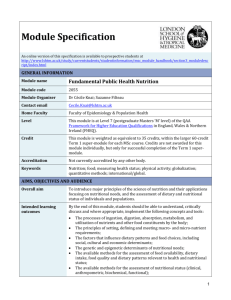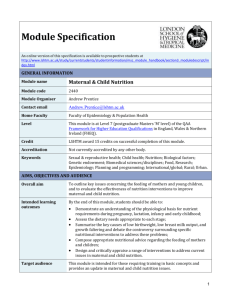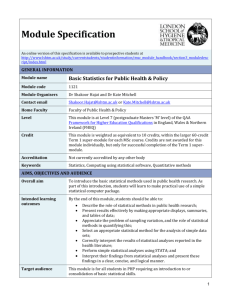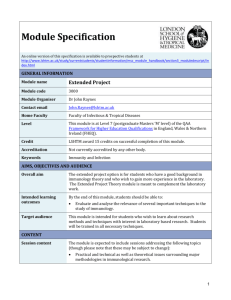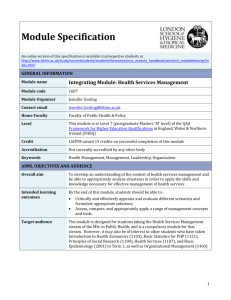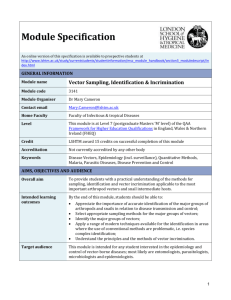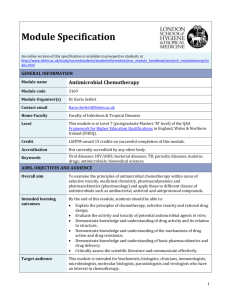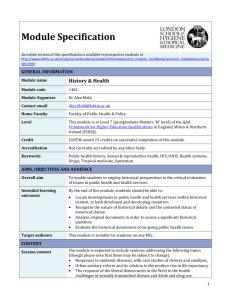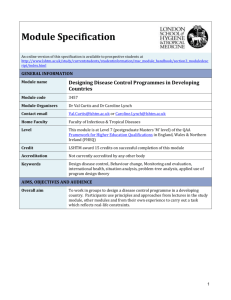2451 Nutrition in Emergencies Module Specification_2016_MK
advertisement
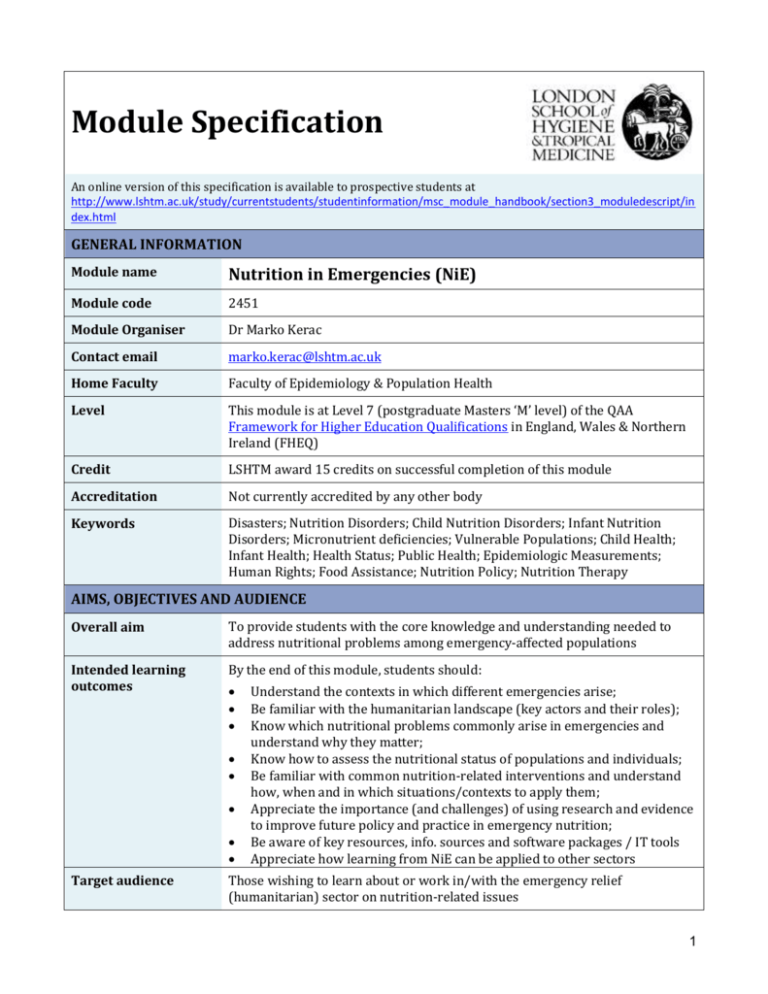
Module Specification An online version of this specification is available to prospective students at http://www.lshtm.ac.uk/study/currentstudents/studentinformation/msc_module_handbook/section3_moduledescript/in dex.html GENERAL INFORMATION Module name Nutrition in Emergencies (NiE) Module code 2451 Module Organiser Dr Marko Kerac Contact email marko.kerac@lshtm.ac.uk Home Faculty Faculty of Epidemiology & Population Health Level This module is at Level 7 (postgraduate Masters ‘M’ level) of the QAA Framework for Higher Education Qualifications in England, Wales & Northern Ireland (FHEQ) Credit LSHTM award 15 credits on successful completion of this module Accreditation Not currently accredited by any other body Keywords Disasters; Nutrition Disorders; Child Nutrition Disorders; Infant Nutrition Disorders; Micronutrient deficiencies; Vulnerable Populations; Child Health; Infant Health; Health Status; Public Health; Epidemiologic Measurements; Human Rights; Food Assistance; Nutrition Policy; Nutrition Therapy AIMS, OBJECTIVES AND AUDIENCE Overall aim To provide students with the core knowledge and understanding needed to address nutritional problems among emergency-affected populations Intended learning outcomes By the end of this module, students should: Target audience Understand the contexts in which different emergencies arise; Be familiar with the humanitarian landscape (key actors and their roles); Know which nutritional problems commonly arise in emergencies and understand why they matter; Know how to assess the nutritional status of populations and individuals; Be familiar with common nutrition-related interventions and understand how, when and in which situations/contexts to apply them; Appreciate the importance (and challenges) of using research and evidence to improve future policy and practice in emergency nutrition; Be aware of key resources, info. sources and software packages / IT tools Appreciate how learning from NiE can be applied to other sectors Those wishing to learn about or work in/with the emergency relief (humanitarian) sector on nutrition-related issues 1 CONTENT Session content The module includes sessions addressing the following topics (please note that details of these may be subject to change): Key definitions, classifications and conceptual frameworks (types of malnutrition; types of emergencies; overlaps with nutritional problems in low resource developmental settings). Why nutrition in emergencies matters; Evidence and research in emergency nutrition: GRADE, CHNRI and other frameworks/ways forward to improve future policy and practice in NiE; The humanitarian landscape: key actors and their different roles and responsibilities; factors determining response capacity; Emergency preparedness and nutrition causal analysis Emergency needs assessment and nutritional surveillance/survey methods Nutrition-specific interventions: e.g. Community Management of Acute Malnutrition; Infant & Young Child Feeding; micronutrients Nutrition-sensitive interventions: e.g. Cash transfers Community engagement and coverage survey methods Policy issues in emergencies Current challenges and controversies in nutrition in emergencies. TEACHING, LEARNING AND ASSESSMENT Study resources provided or required A reader containing key literature and links to key resources is provided at the module start. Lecture handouts are posted online as the module progresses. Teaching and learning methods Teaching will be a combination of lectures and active student participation in discussions, debates, role plays and case presentations. Assessment details Students will be assessed by a multiple choice/short-answer test which contributes to 100% of marks. For students who are required to re-sit, or granted a deferral or new attempt, the task will be an essay-style assignment on a NIE-relevant topic. Assessment dates The assessment will take place on a date notified by the Module Organiser, usually in the final week of the module. For students who are required to re-sit, or who are granted a deferral or new attempt, the next assessment date will be the standard School-recommended date in mid/late September 2016. Language of study and assessment English (please see ‘English language requirements’ below regarding the standard required for entry). TIMING AND MODE OF STUDY Duration The module runs for 5 weeks at 2.5 days per week; this module runs between Monday morning and Wednesday lunchtime. Dates For 2015-16, the module will start on Monday 22 February 2016 and finish on Wednesday 23 March 2016. Timetable slot The module runs in LSHTM timetable slot D1 2 Mode of Study The module is taught face-to-face in London. Both full-time and part-time students follow the same schedule. For full-time students, other LSHTM modules are available in the other half of the week for the C and D slots. Learning time The notional learning time for the module totals 150 hours, consisting of: Contact time ≈ 60 hours Directed self-study ≈ 15 hours Self-directed learning ≈ 30 hours Assessment, review and revision ≈ 45 hours APPLICATION, ADMISSION AND FEES Pre-requisites Although no previous experience of NiE is necessary, a basic understanding of nutrition and health is important. Students with limited or no prior knowledge of these areas should discuss with the module organizer before applying. English language requirements A strong command of English is needed for this module. These whose first language is not English or whose prior university studies have not been wholly in English must fulfil LSHTM’s English language requirements: an acceptable score in an approved test taken in the two years prior to entry. Applicants may be asked to take a test even if the standard conditions have been met. Student numbers Typically 20-30 students per year; numbers may be capped due to facility or staffing limitations. Student selection Preference will be given to LSHTM MSc and LSHTM research degree students. Others meeting the entry criteria will usually be offered a place in the order applications are received, until any cap on numbers is reached. Applicants may be placed on a waiting list and given priority the next time the module is run. Full Registration (full participation) by LSHTM research degree students is required for this module, but the assessment for these students is optional. Fees For LSHTM MSc students, module fees are included within MSc fees (given on individual course prospectus pages). If registering as a stand-alone short course, individual module fees apply. Tuition fees must be paid in full before commencing the module, or by any fee deadline set by the Registry. Scholarships Scholarships are not available for individual modules. Some potential sources of funding are detailed on the LSHTM website. Admission deadlines For 2015-16: For registered LSHTM MSc students, the module choice deadline (for Term 2 and 3 modules) is Friday 20 November 2015. If registering just for this module, applications may be made at any time and at the latest 8 weeks prior to start date. Early applications are however strongly advised. Formal registration takes place on day one of the module. ABOUT THIS DOCUMENT This module specification applies for the academic year 2015-16 Last revised 29 May 2015 by Marko Kerac; 20 August 2015 minor updates by Sarah Bathie London School of Hygiene & Tropical Medicine, Keppel St., London WC1E 7HT. www.lshtm.ac.uk 3 4
